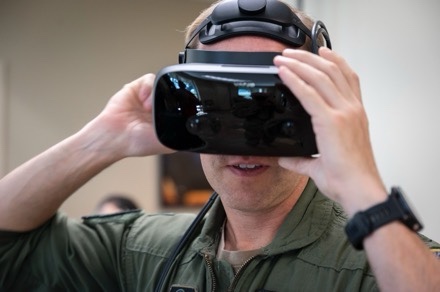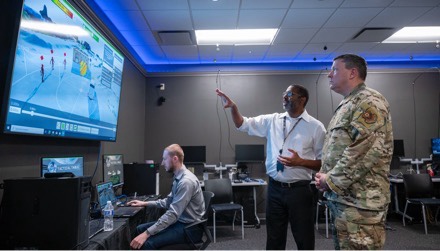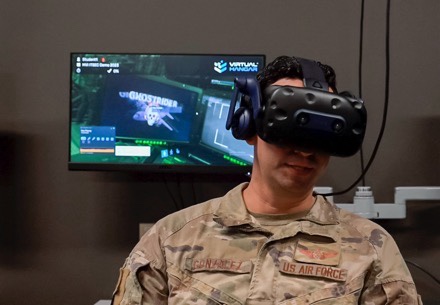HURLBURT FIELD, Fla. —
Extended Reality (XR) is revolutionizing the way Air Force Special Operations Command is approaching training and readiness. XR is an umbrella term that encompasses Virtual Reality (VR), Augmented Reality (AR), and Mixed Reality (MR) to create a spectrum of experiences that range from fully virtual environments to overlays of digital content onto the real world. These technologies manipulate our perception of reality, hence the term “extended.” The manipulation of reality is at the core of XR, and it’s transforming the training landscape of AFSOC.

The XR Training Program’s mission is to provide Air Commandos the ability to conduct repetitive readiness training anyplace at any time through secure, autonomous learning distribution and reporting across all command disciplines. The vision is equally ambitious: to be a training program that employs virtual, mixed, and augmented training methodologies, producing warfighters with greater skillset competencies and proficiency in a more realistic environment, at a reduced cost, and on a shortened timeline.
In the beginning of FY23, AFSOC established an XR cross-functional team dedicated to creating an XR Training Framework for the entire command.
“Our first step as a command was to admit we had fallen behind in the evolution of training technology,” said Capt. Kyle Schoonover, Chief of AFSOC XR Training Program. “In true AFSOC fashion, in just a few months we went from this realization to producing a MAJCOM-wide framework capable of incorporating all existing XR technologies as well as charting a path forward for future development in the years to come.”

This framework operates on a crawl, walk, run strategy, composed of four distinct lines of effort (LOEs):
LOE 1: Virtual Hangar
The foundational effort for XR in AFSOC focuses on initial qualification academic training for all aircrew support and mission support personnel, including maintenance and Mission Sustainment Teams. A prime example of this is the “Virtual Hangar” initiative by AFSOC A4. This innovative program leverages VR to enhance AC-130J, MC-130J, CV-22 and munitions maintenance workforce training. The “Virtual Hangar” offers comprehensive Instructor Tools and custom-built Learning Modules, ranging from checklist execution to 3D-modeled schematic overlays.
LOE 2: NexGen Instructor
AFSOC plans to incorporate VR into all Flying Training Units (FTUs) responsible for training AFSOC aircrew. Training modules will cover the academic phases of the FTU syllabi such as academics on aircraft systems and mission equipment. Collaborative partnerships with other Major Commands (MAJCOMs) will be pursued when appropriate, and pathfinding will be the norm when required.
LOE 3: Fusion & Integration
The integration of XR into operational units is a pivotal aspect of AFSOC’s strategy, with a particular emphasis on mission events. These events can range from emulated flight of AFSOC aircraft, to special tactics, to our medical community across the entire continuum of patient care.
LOE 4: The Future Fight

The pinnacle of AFSOC’s XR Training Framework envisions the utilization of Augmented Reality (AR) for aircrew and special tactics teams. Imagine a CV-22 pilot flying over Melrose Air Force Range in New Mexico while their visor displays real-world terrain from distant locations like the Indo-Pacific region. Meanwhile, the pilot’s visor reveals a digital wingman controlled by a ground-based XR device. The goal is to replicate any battlespace via XR technology back at the home station.
“AFSOC’s XR framework provides every unit in the command with a readily digestible and easily repeatable strategy to modernize their training through next-generation methodologies of instruction,” said Schoonover.
The AFSOC XR Training Framework’s implementation is ongoing. While teams across AFSOC continue to work through LOE 1 by immersing in virtual reality and “Virtual Hangars”, LOE 2 is on the horizon with small group XR testing sessions with the AC-130J FTU planned for Summer 2024 and the C-146 FTU planned for Fall 2024. As investment into the training program framework continues, the line of efforts will gain momentum.
“AFSOC is heavily invested in enhancing readiness and training through initiatives like XR,” said Lt. Gen. Tony Bauernfeind, AFSOC commander. “The use of XR in training allows Air Commandos to experience highly realistic simulations of complex scenarios, missions, and environments they may encounter in real-world operations. This practice is paramount as we prepare for current and future operating environments. I’m excited to see where this program goes and we will be ready to build upon each line of effort as resources become available.”
With a comprehensive XR Training Framework in place, AFSOC is poised to transform its training methodologies, ensuring that Air Commandos are better prepared and equipped for strategic competition.
By Capt Amy Rasmussen
Air Force Special Operations Command Public Affairs


“Imagine a CV-22 pilot flying over Melrose Air Force Range in New Mexico while their visor displays real-world terrain from distant locations like the Indo-Pacific region.”
A pilot flying over terrain but seeing a different terrain from somewhere else. That seems like a really, really bad idea.
A great idea to use in a simulator, not so much inflight where one might run into unseen terrain and obstacles.
Matt